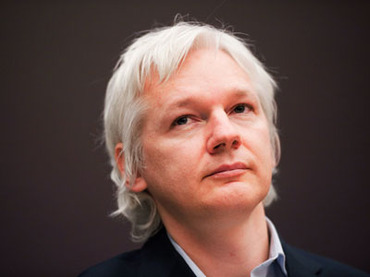Aaron’s death teaches us an important lesson about how the law operates here in 21st-century America. He was not the only local activist to be unnecessarily persecuted by government agencies. Laws relating to our Internet activities have been drawn so widely and so poorly that eager prosecutors can find grounds for indicting more or less anyone, for things that in former times the law would not have defined as crimes at all. Government agencies can now open investigations on people, and subject them to the sledgehammer of the criminal justice system, on the strength of nothing more than unwise posts on Twitter or translating the wrong materials. Prosecutors answer to nobody regarding the fairness or proportionality of their investigations.
The result is that dissidents who hamper powerful interests can far too easily be investigated and silenced. The result is that brilliant, original and public-spirited souls like Swartz exhaust their energies on meaningless legal battles, rather than developing new and wondrous technologies to solve problems we all face. We’ll never know now what Aaron Swartz would have come up with next, thanks to the casual brutality of a criminal justice system that cares more for creating criminals than for achieving justice. Journalist Radley Balko has an excellent piece on “The Power of the Prosecutor” – he’s a conservative, but he gets what’s going on.
Know what side you’re on. Overcriminalization hurts us all. We need to stand together, and rein in this crazy system, before it chews us all up.
Alex Marthews is the President of a new group based in Cambridge, the Campaign for Digital Fourth Amendment Rights.







…with the generalized statement that prosecutors answer to nobody. At the state level they are elected so theoretically a DA could be tossed out by the voters for overreach.
I don’t know enough about the specifics, particularly the technical specifics to comment on Schwartz and what the hackers did. I agree wholeheartedly that the sentencing was disproportionate and the prosecution overzealous, but that does not mean Schwartz was some martyr for getting information, he was hacking and stealing protected information-particularly copyrighted academic information-which we should not applaud. Intellectual property is just as integral to academic freedom and the pursuit of knowledge as having a more open society. We should balance and not drift from one extreme to the other.
And don’t group Assange and Manning in with Schwartz, those men deliberately put lives at risk around the Globe and severely undermined our nations ability to pursue global democracy and Wikileaks has chilled off the record diplomatic candor making our world less safe.
The punishment should fit the crime and we should all be vigilant in ensuring Mannings human and civil rights are being protected and preserved, and its unclear if they are. I will never argue with that. But I will argue that he is a not a whistleblower but a disturbed individual who thoughtlessly lashed out against his government by putting his fellow soldiers and countless intelligence and diplomatic operatives in harms way.
Schwartz was accused of, roughly speaking, two things:
1. Breaking into an unlocked closet
2. Violating the copyrights owned by JSTOR.
JSTOR wasn’t interested in pressing charges or a civil suit. I’ll repeat: the holder of the copyright wasn’t interested in pursuing.
That leaves entering an unlocked closet.
He didn’t just “break into a closet.” He used sophisticated means to hack into MIT’s network and evaded repeated attempts to prevent him from obtaining access. As my comment below shows, I think he was clearly overcharged, but this is not a case of simple criminal trespass.
He plugged his computer into the network switch, probably with an ethernet cable. He changed an MIT computer’s IP address. He ran a python script to get the files, probably a simple script that worked through each subdirectory and downloaded every file on it. The files were downloaded onto the laptop hard drive [which he later handed over to the organization in charge of JSTOR].
I guess one man’s sophisticated is another man’s trivial. If writing a script is sophisticated, then sure. If hacking into MIT’s network is walking up to a network device and plugging an Ethernet cable in to it, then sure. He’s a hacker. But those things — the script, the wire, changing the IP address — result in no physical damage, and my understanding is that when he left, he “put things back the way he found them.” In other words, it seems that MIT didn’t suffer a bit in any real sense, except that they now felt unsafe around their own grounds because some kid opened a closet door.
All of that “hacker” nonsense seems to me like trumped up Matrix/Sneakers/random crime show hype. The level of sophistication is irrelevant. What’s relevant is what he *did*. He downloaded a bunch of files for which MIT had unrestrained access. He did it by trespassing in a closet. That’s the story. Trying to make it more exotic because he was “sophisticated” is really irrelevant.
Most insurance companies will reject claims for property removed from an unlocked vehicle.
Here is Orin Kerr’s account:
In Swartz’ first attempt, he purchased a laptop, went into a building at MIT, and used the MIT wireless network to create a guest account on MIT’s network. He then accessed JSTOR and executed a program called “keepgrabbing” that circumvented JSTOR’s limits on how many articles a person could download — thus enabling Swartz to start to download a massive number of articles. MIT and JSTOR eventually caught on to what was happening, and they blocked Swartz’s computer from being able to access the MIT network by banning the IP address that he had been assigned.
Swartz responded by changing his IP address, and it took a few hours before JSTOR noticed and blocked his new IP address. To try to stop Swartz from just changing IP addresses again, JSTOR then blocked a range of IP addresses from MIT and contacted MIT for more help. MIT responded by canceling the new account and blocking Swartz’ computer from accessing the MIT address by banning his MAC address, a unique identifier associated with his laptop.
Undeterred, Swartz tried again. This time he brought a new laptop and also spoofed the MAC address from his old one to circumvent the ban. Using the two latops and the program designed to circumvent JSTOR’s limits on downloading articles, he started to download a significant chunk of JSTOR’s database. A day or two later, JSTOR responded by blocking all of MIT’s access to JSTOR for a few days.
Again undeterred, Swartz came up with a different plan. Instead of trying to connect to the MIT network wirelessly, Swartz broke into a closet in the basement of a building at MIT and connected his computer directly to the network — hiding his computer under a box so no one would see it. Over a month or two period, he succeeded in downloading a major portion of JSTOR’s database.
I’m no hacker, but this seems a lot more sophisticated than plugging a computer into a network with an ethernet cable or changing an IP address. Just sayin’.
Since you explicitly agree that Mr. Swartz’s actions had nothing to do with Mr. Assange and Mr. Manning, why belabor the red herring at all?
Regarding Mr. Swartz, the sentencing was disproportionate and the prosecution overzealous because of the absurdity of making Mr. Swartz’s action a felony.
He “broke into” an unlocked closet, and the material he copied was already published and dated at that.
Not an expert on the Manning case- you think his intent was to jeopardize the lives of fellow soldiers? How were their lives endangered? Is it like the leakage of Abu Ghraib photos, whereby publicizing anything “embarrassing” or scandalous to the U.S. may be a recruitment tool for the enemy, and is thus treasonous?
The Pentagon Papers did much to end the Vietnam war — they exposed the duplicity of the US government, and the government tried hard to suppress them. Thankfully, a courageous free press and vigorous anti-war movement (led by the young) prevailed.
We now have a government that ignores documented evidence of formal policies of kidnap, abuse, rape, torture and murder — emanating from the Oval Office. I think this government (even under the current administration) will benefit from a little less “off the record diplomatic candor”
I just have to respond to this:
Not only do I disagree with you, I find it offensive to characterize Mr. Manning in this way. Below is the video that this “disturbed individual” courageously put in the public domain (warning, graphic violence).
This video shows the cold-blooded murder of more than a dozen unarmed civilians, including two children. The blood-thirsty enjoyment of the killers is palpable. Not surprisingly, after an “inquiry”, no charges were brought. Fog of war and all that.
In my opinion, anybody who knows of massacres like this and does NOT disclose them is “disturbed”. If this kind of immoral slaughter is what it takes to preserve democracy, then I think we need to seriously re-examine whether it deserves preservation.
If what the indictment alleges is true, I don’t think there can be any doubt that Swartz committed a crime. The real problem is the prosecutors’ tactic of overcharging in order to prompt a plea agreement. This problem isn’t particular to Swartz’s case, but is a general feature of federal criminal practice today. So I don’t see Swartz’s case as important because information wants to be free, I see it as important because it sheds light on a systematic problem that affects people accused of all kinds of less savory crimes. If people finally focus on overcharging as a systemic problem, then perhaps something good will have come from Swartz’s tragic death.
I also think there is a kind of patronizing attitude in posts such as this. “How dare some plebian, Windows 95 loving, IPv4 using, prosecutor harass this creative genius whose only crimes were trespass and copyright infringement? Ordinary mortals cannot sit in judgment on the new creative uberclass!” I’m just saying–spare a thought for the prosecutor who got assigned to this case and probably handled it like he would have handled any other criminal case.
While that may be true in the breaking and entering sense, I think there’s a pretty strong argument that any crime beyond that was malum prohibitum rather than malum in se. Orin Kerr, who knows a lot about this stuff and who is no lefty, writes that, yes, Swartz’s conduct fit the statute under which he was charged, but it’s a bad statute and should be amended.
I think you are right about Kerr’s view on the Computer Fraud and Abuse Act, but I don’t see anything in Kerr’s pieces suggesting he has any doubts about wire fraud.
Also, even if Swartz’s aims were not bad in themselves (nice use of law school Latin, by the way), his means were.
I don’t agree that overcharging was done solely to make a plea bargain more attractive. The deal offered was still to a felony charge, and that’s completely out of line given what Swartz was accused of doing. I suspect the charge was more to make an example out of Swartz in order to try to deter others from doing something similar. And that’s also a problem: not treating each case as it should be based on its merits, common sense, and what punishment is actually appropriate.
I didn’t ring it up out of thin air it was at the bottom
of the initial posting. In no way do I think the Schwarz case and Manning case are related at all, I merely commented that they are entirely different which the author of the post disagrees with on his list of martyrs.
Manning and wiki leaks were random, they just leaked a ton of information with no care for the consequences and a lot of good and a lot of bad happened because of it. But I have friends serving in Afghanistan in the Army and Guard, a friend with the Pacifc fleet, and a few friends in the Foreign Service and CIA-and I want none of them harmed. The vast majority of people
serving this country do it at great sacrifice to their personal lives to protect the rest of us. Ellsberg was trying to stop any more Americans dying in an unjust war that he and the brass knew was a lost cause. Had Manning merely leaked information of that sort he could be lauded, information that serves the public.
But he leaked a ton of info without any thought trying to be a second rate Ellsburg (or Gordon Liddy in my book), violated an oath he made to God and country and violated the highest security clearances. My clearance is active but will expire soon and I have not used it since 2008-but I had access to some of the same general cables and information and while I disagreed with my bosses (Rice and Bush at the time) I would
never have dreamed of violating that oath and I consented to prosecution if I did.
Hillary Clinton is no Dick Nixon, she is protecting our soldiers, diplomats and intelligence workers. Manning is as bad as Cheney when he outed Plame and both should be prosecuted. If you thought Plame was bad wiki leaks ended the careers and compromised the covers of hundreds of innocent people working for us. The man should not be tortured, executed, denied due process and civil and human rights or jailed indefinitely. Everything about his trial is the kind of post-9/11 gulag state BS I’ve always opposed. But he does belong in a cell.
Daniel Ellsberg was a 40 year old Pentagon official with a PhD in Economics from Harvard. He was a senior analyst in the Pentagon, and had an lengthy extensive military background. Bradley Manning was a 20 year old private who encountered convincing evidence of war crimes, duplicity, and pervasive corruption all being protected by “national security”. I suspect Mr. Manning would feel complemented at being described as a “second-rate Ellsburg”. Perhaps you expect the same wisdom and courage from a 20 year old private that we saw modeled by Mr. Ellsberg — I do not. If you actually did see the video that Mr. Manning released and kept silent, then in my view you are in no position to disparage anybody who made a different choice.
The pervasive corruption, dishonesty, and double-dealing exposed by WikiLeaks should have ended the careers of those involved. If more “innocents” who knew of those abuses (apparently like you) had chosen a different path, the world might be a better place today. If crimes were committed (and they almost surely were), those crimes were the behavior being revealed — not the behavior of the whistle-blower who released them.
I understand that you (like Mr. Manning), were and are young and therefore may not fully appreciate the consequences of the choices you made and so aggressively defend. In my view, your defense has far too much in common with the “blue line” code of silence that so often enables police brutality and its companion civilian standard that hurts so many innocents in closely-knit ethnic neighborhoods.
You target Richard Nixon, forgetting that America’s shameful involvement in Vietnam was accomplished by JFK and LBJ — both good and loyal Democrats. Had even ONE private, aware of the deceit and explosive implications of the Tonkin Gulf resolution, made the choice Mr. Manning made (and for which you so loudly chastise him), then perhaps Mr. Ellsberg’s courage would not have been so needed — and perhaps Mr. Nixon would have forever been remembered as a failed used car salesman.
Sorry, but I think you’re very much on the wrong side of this question.
n/m
I’d buy into the whistleblower defense if he leaked things he felt were needed to raise public awareness. He didn’t make any choices, he just let released all the data out into the airwaves. Is Dick Cheney noble for leaking Valarie Plames name? Manning blew the cover of hundreds of CIA agents, jeopardized the very lives of moderate Iranian and North Korean diplomats. It is now more likely we will go to war with those nations because of Bradley Manning. Leaking that video, terrible as it is, by itself would be noble, but it also included thousands of information that compromised our ability not just to wage war but also to make peace. Significantly, it cannot be understated how terrible a blow this was to the State Department which is already underfunded and losing considerable clout to the Defense Department. Now the Defense Department will be conducting even more of our diplomacy since State is viewed as a less secure avenue. Would FDR have been able to get Yalta done if every detail of those conversations were made public? What about Truman’s Marshall Plan if an isolationist America found out we would never get repaid and the ‘loans’ were really grants? Or if they found out we were funding political parties to influence elections? He jeopardized the entire system and is a nihilist like Assange, who at least had the dignity to call himself one rather than try and frame his acts as those of a whistleblower.
I am not saying institutions shouldn’t be exposed when they are doing wrong, the difference is he exposed and jeopardized significant numbers of programs, initiatives, and individuals who were doing right.
Mr. Cheney outed (he didn’t “leak” anything) Valerie Plame in an intentional effort to advance a dishonest agenda and in a failed attempt to stop Ms. Plame’s husband from succeeding in his expose of yet another example of his administration’s duplicity.
We can disagree about Mr. Manning’s motives, but your repeated comparison to Mr. Cheney is a distraction.
There is a certain amount of unsavory activity that is always involved in any diplomatic “sausage making”. In my view, Mr. Manning sincerely thought the activities he uncovered went well beyond that. He has already paid a heavy price — well beyond anything suffered by the much more harmful acts perpetrated by the much more powerful figures you cite in your mistaken (in my view) comparisons.
In any case, I suspect we have beat this already dead horse enough.
Oh wait…nothing happened to him. Nor Rove, nor Libby, really, when all was said and done.
Maybe Obama should intervene on Manning’s behalf, just like Bush did for his friend Scooter.